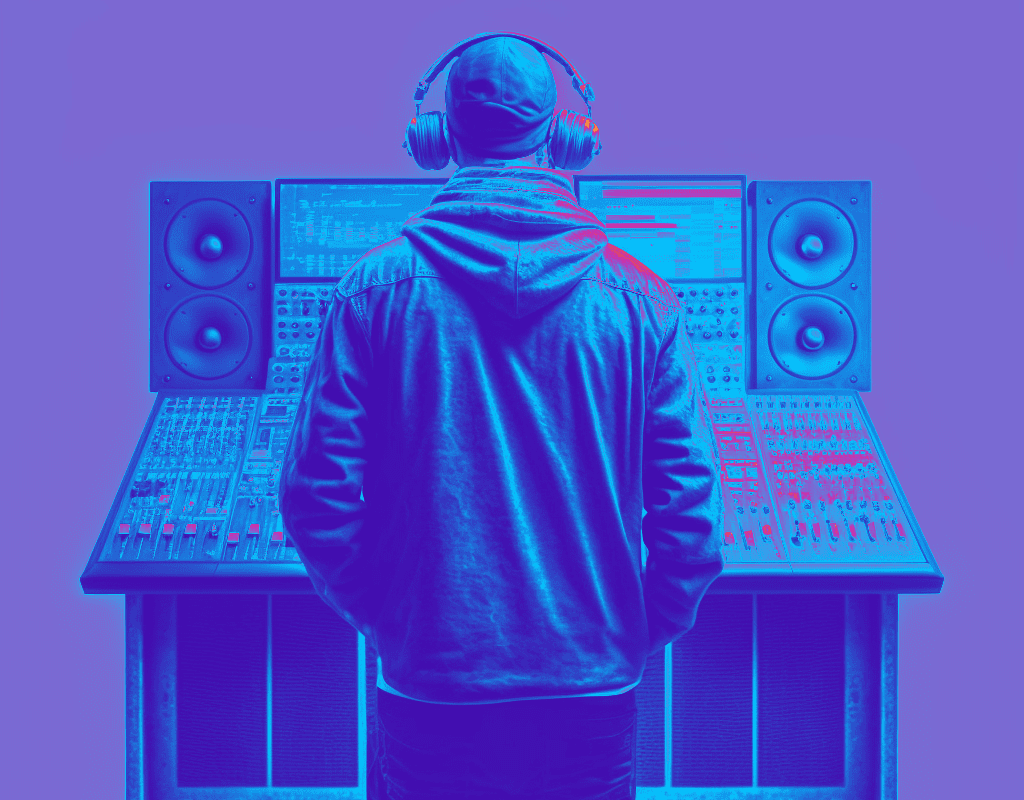Why do people want to be music producers? (Explained)
As the person behind the scenes, music producers tend not to get the limelight when they help create fantastic music.
So why do people want to be music producers?
If you’re considering becoming a music producer, we’ll look at their role and some of the benefits they get in their career.
Let’s get started!
Why do people want to be music producers?
There are four main reasons why people choose to be music producers.
They get involved in music without the stress of going on tour, have solid, consistent pay, get behind-the-scenes fame, and participate in the passion of making music.
The music producer’s role
Music producers have a vitally important role in the music industry.
They actively oversee the song-making process, EPs, or album creation to guarantee high-quality music production.

The music producer wears many hats:
- Writing songs
- Sound engineering
- Song mixing
- Playing instruments, background singing, etc.
- Finding or supplying the studios
- Budgeting
- Studio scheduling
And their role can make or break the quality of an album.
George Martin, the producer, drove much of The Beatles’ music, the most famous band.
He was responsible for guiding the band’s records and getting them signed to a label. He was so influential he was known as “the fifth Beatle.”
Different labels categorize music producers.
- Executive producer: These producers are financially and creatively responsible for the final product, and they work in the studio recording, creating background soundscapes, and mastering the final product.
- Beatmaker: This producer creates beats for artists, mostly in hip-hop.
- Music production artist: This combines the executive producer and beatmaker. They produce instrumental beats and usually have guest musicians to provide vocals. Commonly known as DJs, they also perform their music live.
Less stressful than musicians
Producers finish their job once they complete recording, mixing, and mastering the music in the studio, which is one of the major benefits of being a producer.
They don’t have to worry about any promotional work, tours, or anything a musician has to do outside of simply writing and recording music.

Here are some of the steps musicians would have to take:
- Write, practice, and perfect new songs
- Record the music in the studio with their producer
- Generate buzz around the songs or albums through social media
- Play their music around town
- Go on tour across the country
For many musicians, going on tour is the best part of their job.
But there is a lot of stress that comes with going on tour.
What happens when things go wrong, instruments break, transportation issues, or scheduling conflicts?
Musicians always need to be on their toes.
Tours especially are difficult to schedule, and what can go wrong often does.
Producers, however, are part of the creative and organizational process in the studio, and that’s it!
They are there in the recording studio and post-recording mixing.
They never have to deal with road issues or rude fans.
They never have to rely on ticket or album sales or song plays to pay their bills.
Related article: What Do I Need To Make Music On A Laptop?
Competitive salary
The money is consistent for producers with a steady workflow, especially in the music industry.
However, the salary range for a music producer is quite broad.
Like musicians, the biggest names and earners skew the numbers.
The amount you make depends on several factors:
- Compensation discussed: This is a flat fee for a song, EP, full album, or hourly rate.
- Album percentage: A music producer often makes 2-3% of album sales.
- Advances: If you gain enough credibility, you can get advances before even starting your work.
If you consider producers who help pop musicians create hit songs, they can charge an insane amount of money.
Max Martin, a music producer who has worked with huge names like Brittney Spears, Katy Perry, Maroon 5, and Tayler Swift, charges up to $100,000 per song.
On the flip side of that, though, is new producers. They can charge anywhere from nothing to $3,500 for a song.
The field is also very competitive and unreliable, and producers who are just starting out may have to make a lot of sacrifices.
Some older producers like to say that if you love making music.
You need to spend the first years of your career mastering the crafts, and often new producers don’t make money early on either.
Behind-the-scenes fame
We’ve already mentioned two of the biggest producers in history.
Yet how many people know their names compared to the musicians they work with?
Well, for one, all the biggest names in the music industry do!
As music producers establish a reputation, music style, and vision, some of the best and most famous artists will want to work with them.
That gives producers so much creative sway in the music industry.
Artists will rely on producers to challenge them to go in new, different directions.
Music producers oversee the entire recording process for most bands.
They solve issues, resolve conflict, think on their feet, and offer ideas from an outside perspective.
They are invaluable resources to musicians, without whom their songs wouldn’t be possible.
Passion for music
Last but certainly not least is that music producers can influence various musicians and genres, collaborating and influencing musicians and producing amazing work.
Music producers certainly have different personalities compared to the musicians they work with.
They want to stay away from the limelight and attention but still want to be part of this creative field.
They understand the process of writing, mixing, and mastering songs, and usually, they can offer objective insight into the sounds they’re creating with the musicians.
Conclusion
Any career has its pros and cons.
Being a music producer offers the chance to participate in music creation without the added stress of touring, provides a stable income, and offers a unique form of behind-the-scenes fame.
The rewards can be significant if you are passionate about music and are considering a career in music production.
Are you thinking about joining the world of music production? Let us know in the comments.
Frequently Asked Questions
What does a music producer actually do?
A music producer is responsible for overseeing the entire process of music creation. They help create songs and albums, playing an essential role in choosing singles for radio listening and TV viewing. Their tasks include arranging and editing songs, working with artists, and managing all aspects of the production process. Indeed provides a comprehensive guide to understanding the role of a music producer.
What are the main benefits of being a music producer?
There are several benefits of being a music producer. One of the main reasons people choose this career path is the opportunity to contribute to the creation of fantastic music and collaborate with talented artists. They also enjoy a certain level of recognition and respect within the music industry, which can be gratifying. We at Sound Kickers discuss these benefits further.
Is it difficult to become a successful music producer?
Becoming a successful music producer requires a combination of passion, drive, a strong work ethic, and a sense of responsibility. Additionally, business skills and musical abilities are essential for navigating the industry. While it can be challenging to establish a successful career, those with the right skill set and dedication can thrive in this field; for more insights on what it takes to be a music producer, visit Recording Connection.
How do music producers make an impact on the industry?
Music producers play a vital role in the music industry by shaping the overall sound of songs and albums. They bring out the best in artists, providing guidance and creating unique audio experiences for listeners. Their expertise and innovative techniques can significantly impact the industry, influencing musical trends and defining the sound of specific genres.
What are the potential challenges a music producer may face?
Music producers may face various challenges, such as managing tight schedules, negotiating contracts, and navigating the ever-changing landscape of the music industry. They also need to stay updated on new technologies, trends, and industry shifts while maintaining their artistic vision and adapting to different working styles. Collaboration and understanding between the producer and artist are essential for overcoming these challenges.
How can one start a career in music production?
Aspiring music producers can begin by developing their technical skills and musical knowledge through formal education, self-teaching, or mentorship. Gaining hands-on experience in recording studios, working with local artists, or collaborating on projects can provide valuable insights into the industry. Networking, building a strong portfolio, and continual learning are essential for launching and sustaining a successful career in music production.
References
https://www.salary.com/research/salary/recruiting/music-producer-salary
https://www.npr.org/sections/money/2012/01/20/145466007/katy-perrys-perfect-game
https://americansongwriter.com/just-how-important-was-george-martin-to-the-beatles/







